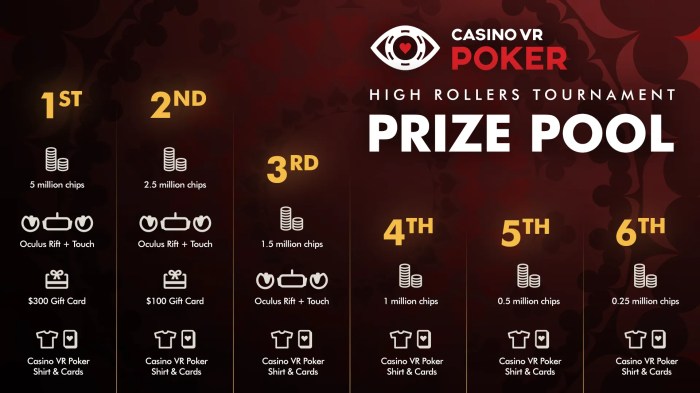Tournament Prizes are way more than just swag; they’re the fuel that drives competition, the carrot dangling in front of the donkey (or, you know, gamer). Getting the prize structure right can make or break your tournament, boosting participation and creating a memorable experience for everyone involved. We’re diving deep into all aspects of tournament prizes—from choosing the perfect loot to navigating the legal stuff and crafting an epic award ceremony.
This guide covers everything you need to know to design a killer prize system that’ll have players lining up to compete. We’ll explore different prize types, from cold hard cash to coveted merchandise, and discuss how to create a prize structure that’s both fair and exciting. We’ll also cover budgeting, legal considerations, and how to make your prize ceremony a truly unforgettable event.
Think of this as your ultimate playbook for prize-winning tournament planning.
Types of Tournament Prizes
![]()
Choosing the right prizes is crucial for a successful tournament. The type of prize offered significantly impacts participant motivation, the overall tournament image, and even the cost. A well-considered prize structure can attract a larger, more competitive field, while a poorly chosen one can lead to disappointment and decreased participation in future events.
Prize Categories and Examples
The selection of tournament prizes depends heavily on the target audience, budget, and the overall tone of the competition. Below is a table categorizing common prizes, their typical value, and the audience they best appeal to.
| Prize Category | Example Prize | Typical Value Range | Target Audience |
|---|---|---|---|
| Cash Prizes | $100 – $10,000+ | Highly variable, depending on tournament size and sponsorship | Broad appeal, especially competitive players |
| Merchandise Prizes | Gaming headsets, jerseys, trophies, branded apparel | $25 – $500+ | Fans of the game or brand, less focused on pure monetary value |
| Experiences | VIP tournament tickets, meet-and-greets with professionals, travel packages | $100 – $10,000+ | Enthusiastic players seeking unique opportunities |
| In-Game Items/Currency | Rare skins, premium subscriptions, in-game currency | Variable, depends on the game’s economy | Players heavily invested in a specific game |
| Gift Cards | Amazon, Steam, PlayStation Network gift cards | $25 – $200+ | Broad appeal, offers flexibility for recipients |
Advantages and Disadvantages of Prize Types
Different prize types offer unique advantages and disadvantages. Cash prizes, while universally appealing, can be expensive. Merchandise, on the other hand, can be more cost-effective but may not be as desirable to all participants. Experiences create memorable moments but often require more logistical planning. In-game items appeal to a niche audience, and gift cards offer flexibility but lack the “wow” factor of other options.
Monetary vs. Non-Monetary Prizes: Motivational Effectiveness
Monetary prizes are often considered the most effective motivator, as they provide direct financial benefit. However, non-monetary prizes, such as experiences or merchandise, can be equally motivating, particularly for players who are already passionate about the game or brand. For example, a highly sought-after gaming headset might be more motivating to a dedicated gamer than a smaller cash prize.
The effectiveness of each type depends on the specific target audience and the overall tournament context. A professional esports tournament will likely prioritize cash prizes, while a smaller, community-based tournament might find greater success with a combination of cash and merchandise.
Prize Value and Budgeting

Planning the prize budget for your tournament is crucial for its success. A well-defined budget ensures you can offer attractive prizes that incentivize participation while staying within your financial constraints. Failing to budget appropriately can lead to disappointing prizes or exceeding your overall event budget. This section will explore strategies for determining a suitable budget and calculating the value of different prize types.Determining an appropriate budget involves considering several key factors.
A larger participant pool naturally necessitates a larger prize pool to maintain competitive fairness and excitement. Securing sponsorships can significantly boost your budget, allowing for more substantial prizes or a wider range of prize options. The overall event budget, of course, acts as an upper limit; your prize budget should be a reasonable percentage of your total funds, preventing it from overshadowing other essential event costs.
Budget Determination Based on Factors
Consider a hypothetical tournament with 100 participants. If the event organizers anticipate a total budget of $5,000 and aim to allocate 30% to prizes, the prize budget would be $1,500. This could be further refined by considering sponsorship. If a sponsor contributes $500, the remaining budget for prizes from event funds would be $1,000. This budget can then be allocated across various prize tiers, perhaps a grand prize of $500, three second-place prizes of $100 each, and several smaller prizes totaling $400.
The number of participants and sponsorship contributions will influence the final budget and prize allocation. For a smaller tournament with fewer participants and limited sponsorship, the prize budget might be significantly lower, perhaps only 10-20% of the total budget.
Prize Value Calculation
Calculating prize value requires considering both monetary and non-monetary aspects. Monetary value is straightforward—it’s the direct cost of the prize. Non-monetary value, however, is more subjective and depends on the perceived desirability of the prize. For example, a high-end gaming headset might have a monetary value of $200 but a significantly higher perceived value to a gamer.
Conversely, a $200 gift certificate to a department store might hold less value for a gamer than the headset. Tournament organizers should consider the target audience and their likely preferences when determining prize value.
Cost Breakdown for Prize Procurement and Distribution
The costs associated with procuring and distributing prizes vary greatly depending on the prize type. Physical prizes like trophies, merchandise, or electronics incur costs related to purchasing, shipping, and potentially engraving or customization. Digital prizes, such as gift cards or game keys, have lower procurement costs but may involve transaction fees or platform charges. Distribution costs can include shipping fees for physical prizes, email delivery costs for digital prizes, or the cost of on-site prize distribution at the tournament venue.
For instance, a physical trophy might cost $50 to purchase and $10 to ship, while a digital gift card might involve a small transaction fee of $1. Accurate budgeting requires considering all these factors for each prize type.
Legal and Tax Implications of Prizes

Offering prizes, especially substantial cash prizes, in tournaments introduces legal and tax complexities for both the organizers and the winners. Understanding these implications is crucial to avoid potential liabilities and ensure a smooth, compliant event. Failure to navigate these aspects correctly can lead to significant financial penalties and reputational damage.Legal and tax regulations surrounding prizes vary depending on factors such as the prize’s value, the location of the tournament, and the participants’ residency status.
Organizers must comply with local, state, and federal laws regarding gambling, prize disclosures, and tax withholding. Winners, in turn, are responsible for reporting and paying taxes on their winnings, the specifics of which depend on their individual circumstances.
Prize Value and Gambling Laws
The value of the prize significantly impacts legal compliance. Prizes exceeding a certain threshold may trigger gambling regulations, requiring organizers to obtain licenses or permits. For instance, in many jurisdictions, tournaments offering cash prizes above a specific amount are considered gambling and must adhere to strict regulations, potentially involving licensing, reporting requirements, and age restrictions. Smaller prizes generally avoid these strictures, but organizers should still review local regulations to ensure compliance.
Ignoring these laws can result in hefty fines and legal action. For example, a college sports tournament offering a $10,000 scholarship might fall under different regulations than a poker tournament offering a $100,000 prize.
Tax Withholding and Reporting
Organizers often have a legal obligation to withhold taxes from large cash prizes awarded to winners. The amount withheld depends on the winner’s tax bracket and the relevant tax laws. Accurate documentation of prize amounts and winner information is critical for proper tax reporting. Failure to properly withhold and report taxes can result in penalties for both the tournament organizer and the winner.
For instance, if a tournament organizer fails to withhold the required amount of taxes from a winner’s $50,000 prize, both the organizer and the winner could face penalties and back taxes. Accurate record-keeping, including properly completed tax forms (like a 1099-MISC in the US), is paramount.
Independent Contractor Agreements (for Participants)
In some instances, particularly for professional tournaments, participants might be considered independent contractors rather than mere hobbyists. This classification has tax implications for both the organizer and the participant. Proper contracts outlining the nature of the relationship and the tax responsibilities of each party are essential. Without such contracts, disputes and misclassifications could arise, leading to significant financial and legal issues for all involved.
For example, a professional esports tournament might require participants to sign contracts defining their status as independent contractors, outlining responsibilities related to tax reporting, and specifying the payment terms for prize money.
Legal Checklist for Prize Selection and Awarding
Before selecting and awarding prizes, a comprehensive checklist is essential to mitigate legal risks. This checklist should include:
- Reviewing all applicable federal, state, and local laws and regulations related to prizes and gambling.
- Determining the appropriate tax withholding requirements based on prize value and winner residency.
- Establishing clear and transparent rules and guidelines regarding prize eligibility and awarding.
- Obtaining necessary licenses or permits if required by applicable gambling regulations.
- Developing standardized documentation, including contracts and tax forms, for all prize recipients.
- Maintaining accurate records of all prize awards and related tax information.
- Seeking legal counsel to ensure full compliance with all relevant regulations.
Prize Presentation and Ceremony

Making the prize-giving ceremony a memorable event is crucial for leaving a lasting positive impression on tournament participants. A well-designed ceremony elevates the entire tournament experience, transforming it from a mere competition into a celebrated occasion. The presentation should reflect the tournament’s theme and the effort invested by all involved.A thoughtfully planned prize ceremony can significantly enhance participant engagement and encourage future participation.
The atmosphere, the presentation of awards, and the speeches all contribute to the overall impact. A poorly executed ceremony, conversely, can diminish the value of the tournament and leave participants feeling undervalued.
Creative Prize Presentation Design
Imagine a prize ceremony held under a sprawling tent, adorned with banners displaying tournament sponsors and logos. The setting could be a lush garden, a modern event space, or even a themed location relevant to the tournament’s focus. Lighting plays a crucial role; soft, warm lighting creates an intimate atmosphere, while dramatic spotlights can highlight award recipients. Custom-designed trophies or medals, personalized with the winner’s name and tournament details, add a touch of class.
Music, carefully selected to build anticipation and celebrate achievements, sets the tone. Instead of standard podiums, consider using unique presentation platforms, perhaps reflecting the tournament’s theme. For example, a gaming tournament might use a stage designed like a futuristic control panel.
Enhancing Excitement and Prestige
Several strategies can heighten the excitement and prestige of the event. Consider incorporating multimedia elements, such as video montages showcasing tournament highlights or interviews with participants. A live band or DJ can create a vibrant atmosphere, and interactive elements like photo booths or social media walls encourage audience participation. Guest speakers, such as renowned athletes or industry professionals relevant to the tournament’s field, can add credibility and inspire participants.
A red carpet entrance for the winners, complete with photographers and a celebratory atmosphere, can significantly boost the prestige. Furthermore, live streaming the ceremony online expands its reach and creates a sense of broader recognition for the winners.
Examples of Memorable Prize Presentations, Tournament Prizes
The 2019 League of Legends World Championship closing ceremony in Paris is a prime example. The spectacular stage production, featuring elaborate light shows and musical performances, created an electrifying atmosphere. The presentation of the Summoner’s Cup, the championship trophy, was a highly emotional moment, amplified by the crowd’s energy and the broadcast’s global reach. The event’s impact was widespread, attracting millions of viewers and solidifying the tournament’s place in esports history.
Similarly, the Oscars ceremony consistently provides a benchmark for high-production value and emotional impact. The carefully choreographed presentations, the emotional acceptance speeches, and the overall atmosphere create a sense of prestige and celebration. The impact of these events extends beyond the immediate audience, shaping public perception and influencing future events.
FAQ: Tournament Prizes
What if a prize is damaged during shipping?
Most often, the responsibility falls on the shipper, so file a claim with them ASAP. If it’s a smaller issue, you might work it out directly with the winner.
How do I handle international tax implications for prizes?
This gets complicated quickly! You’ll need to consult a tax professional familiar with international tax laws. There are varying rules depending on the prize value and the countries involved.
What if I run out of budget for prizes?
Time to get creative! Consider reaching out to sponsors, reducing the number of prize tiers, or offering alternative non-monetary prizes like bragging rights or featured placement on your website.
Can I use gift cards as prizes?
Totally! Gift cards are a popular and flexible option. Just make sure to choose reputable brands and consider offering a variety of options to cater to different preferences.
